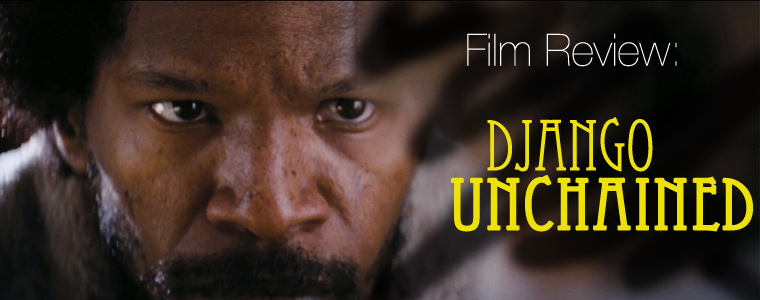Another Stroke of Insensitive, Shoot-’em-up Genius
by Andrew Collins
Django Unchained, the latest from director Quentin Tarantino, self-consciously incorporates the classic tropes of a spaghetti Western with a brash flair of action-flick attitude that refuses to fall completely into our traditional expectations for the genre. We’re familiar with the opening credits in bright yellow font, shoot-’em-up gunfights, Western territories scenery, and campy zoom-in shots at the arrival of new characters, but the final product is unlike any Western I’ve ever seen.
As a prime example, a song with hip-hop elements showed up midway through the eclectic soundtrack, which on the whole tends to draw from Western roots, but puts off a modern vibe at times. Given that the hip-hop jam played as a newly purchased batch of slaves made the long walk to “Candyland,” a plantation home, it felt oddly fitting.
Django treats the subjects of racism and slavery with a brutal yet often comedic irreverence. When Django (Jamie Foxx) and Dr. Schultz (Christoph Waltz) visit a plantation in search of the Brittle brothers, the owner tries to explain to one of his slaves that she isn’t to treat Django like a normal black slave, but he can’t bring himself to simply say that he should be treated like a white man. In another excellent scene (featuring a delightful appearance by Jonah Hill), a band of pre-KKK raiders gather before an attack, only to find that the holes in their hoods are too small to see through. The whole thing is nearly called off until their leader stubbornly demands they go through with it: “Did I say we ain’t wearing bags? It’s a raid! Who cares if you can see! Can the horses see!? That’s all that matters!” Through it all we can’t help but laugh at how sick and twisted the whole business is.
The intentional lack of sensitivity in addressing the race issue is only the beginning. Django bears all the signature Tarantino marks, and by and large, they are for the better. Scene and character dominate, for example, though compared to Tarantino’s previous work, the plot is surprisingly linear and cohesive. This time, the man of the hour is Dr. King Schultz, a German bounty hunter in the employ of the U.S. government. Even under extreme duress, he never loses his sense of propriety, speaking a slightly accented but flawless English that reminds us how some folks back then had a very high regard for the language, and yes, they spoke at a higher level than most of us today. He carries with him the aura of the prototypical character who always has the situation under control and is always one step ahead of any conceivable obstacle or move from his opponent. It starts when he frees Django, and continues in the next scene when he walks into a saloon before it opens, pours himself a beer, and proceeds to shoot the sheriff…in the middle of the town, in broad daylight, so everyone can see.
In perhaps the most signature “Tarantino” move of all, it’s easy to figure out what happened when Samuel L. Jackson stepped out as a grizzled old black assistant named Stephen, cursing to high heaven as to why a black man was to sleep in the guests’ quarters. Tarantino took Jules (from Pulp Fiction), made him 40 years older, and sent him back in time 150 years to the pre-Civil War South. He exists for two simple reasons: to spark a major turning point in the story, and comic relief — a lot of it, all the way down to his last blasphemous breath, “Sweet Jesus let me kill this n*****.”
In contrast to Tarantino’s previous work, I enjoyed how a small but often intense thread of emotion — humanizing moments of love, honor, and compassion — managed to weave through the desensitizing violence. Django wants to free his wife, of course, but the film also prompts us to fall back on our sense of justice and trust in the United States legal system. Dr. Schultz, with his confidence, intelligence, and wit, is a master of playing the ever-pragmatic game of politics. Despite his stated opposition to the institution of slavery, he is a stark proponent of punishing evil men by working within the system, leading Django, and us in the audience, to a tacit sensibility that all of the bloody killing is okay.
That at least seems to be the easiest way to face the violence with such irreverence and humor. The chain comes off (pardon the pun) when the story shifts from the political to the personal — from finding a way to psychologically outmaneuver a sharp aristocrat to eye-for-eye vengeance for the beatings, rapes, and separation that Django’s enslaved wife has endured. At this point, Django takes its place as the latest contribution to one of storytelling’s most beloved conventions. We’ve been telling revenge tales since the dawn of humanity, and tearing a man from his wife ranks among the gravest of sins. There thus comes a point in many revenge stories when the protagonist must do what’s right by him, legal codes and consequences be damned. In Django, that’s where the collective hammer stroke of plot, character, and spectacle falls.
In other words, when it’s time to just shut up and kill the bad guys, it really starts to get fun.








